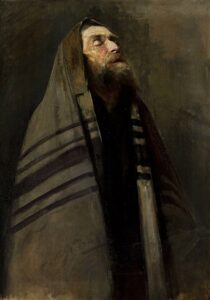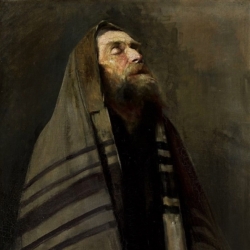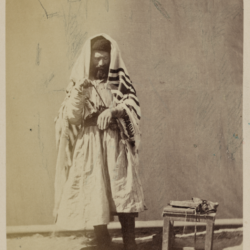In Jewish liturgy, some passages are dəvarim she-bi-qdusha, passages that require public communal prayer. Most famous among these are the Qaddish, Barkhu, and Qədusha. But people are not always able to pray in a community! In liturgical history both ancient and modern many different tashlumim (replacements) for these texts when praying individually have been suggested. The following is a replacement for the Ḥatsi Qaddish of Minḥah that used to be found in many traditional Ashkenazi siddurim.
While Isaac Seligman Baer’s Seder Avodat Yisrael was used as a source, these specific replacements are also found in works as varied as the Kitsur SheLaH and the siddur of the Yaavets. (This is exceptionally ironic since the known heresy-hunter was the one who proved the Kitsur SheLaH was a Sabbatean work!) Many of the texts found here are in variant form, often a form not found elsewhere in manuscripts.
| Source (Hebrew) | Translation (English) |
|---|---|
מי שאינו יכול להתפלל עם הציבור או שאיחר לבוא לביה״כ ולא שמע קדיש או ברכו או קדושה הוא ישלים חסרונו בפסוקים וברייתות המדברות מענינים אלו, וע״פ הנוסחאות הנאות. |
One who cannot pray with the community or who is late in coming to synagogue and did not hear the Qaddish, Barkhu, or Qədushah, can make up his absence with verses and tannaitic teachings that speak of these matters, and according to the appropriate nusḥaot. |
בתפלת מנחה במקום חצי קדיש יאמר זה אחר תחנון׃ |
For the minḥah prayer, in place of the Ḥatsi Qaddish, one may say this after Taḥanun: |
זֶה אוֹמֵר אֲנִי בִּמְקוֹם חֲצִי קַדִּישׁ קֹֽדֶם מִנְחָה׃ |
This I am saying in place of the Ḥatsi Qaddish before Minḥah! |
וְעַתָּ֕ה יִגְדַּל־נָ֖א כֹּ֣חַ אֲדֹנָ֑י כַּאֲשֶׁ֥ר דִּבַּ֖רְתָּ לֵאמֹֽר׃ (במדבר יד:יז) וְהִתְגַּדִּלְתִּי֙ וְהִתְקַדִּשְׁתִּ֔י וְנ֣וֹדַעְתִּ֔י לְעֵינֵ֖י גּוֹיִ֣ם רַבִּ֑ים וְיָדְע֖וּ כִּֽי־אֲנִ֥י יְהֹוָֽה׃ (יחזקאל לח:כג) |
And now, let the strength of my Master greaten, as You spoke, saying… (Numbers 14:17) And I will be greatened and sanctified and made known to the eyes of the many nations, and they will know that I am the Cause. (Ezekiel 38:23) |
בָּרְכִ֥י נַפְשִׁ֗י אֶת־יְ֫הֹוָ֥ה יְהֹוָ֣ה אֱ֭לֹהַי גָּדַ֣לְתָּ מְּאֹ֑ד ה֖וֹד וְהָדָ֣ר לָבָֽשְׁתָּ׃ (תהלים קד:א) |
Bless the Cause, my soul! O Cause my God, You are very great, pomp and pageantry You wear. (Psalms 104:1) |
לֶהֱוֵ֨א שְׁמֵ֤הּ דִּֽי־אֱלָהָא֙ מְבָרַ֔ךְ מִן־עָלְמָ֖א וְעַ֣ד עָלְמָ֑א דִּ֧י חׇכְמְתָ֛א וּגְבוּרְתָ֖א דִּ֥י לֵֽהּ־הִֽיא׃ (דניאל ב:כ) |
May the name of God be blessed from eternity until eternity, as wisdom as strength is Theirs. (Daniel 2:20) |
תַּנְיָא אָמַר רַבִּי יוֹסֵי פַּֽעַם אַחַת הָיִֽיתִי מְהַלֵּךְ בַּדֶּֽרֶךְ וְנִכְנַֽסְתִּי לְחׇרְבָּה אַחַת מֵחׇרְבוֹת יְרוּשָׁלַֽיִם לְהִתְפַּלֵּל בָּא אֵלִיָּֽהוּ זָכוּר לַטּוֹב וְשָׁמַר לִי עַל הַפֶּֽתַח… אָמַר לִי בְּנִי מָה קוֹל שָׁמַֽעְתָּ בְּחׇרְבָּה זוֹ וְאָמַֽרְתִּי לוֹ שָׁמַֽעְתִּי בַּת קוֹל שֶׁמְּנַהֶֽמֶת כְּיוֹנָה וְאוֹמֶֽרֶת אוֹי שֶׁהֶחֱרַֽבְתִּי אֶת־בֵּיתִי וְשָׂרַֽפְתִּי אֶת־הֵיכָלִי וְהִגְלֵיתִי אֶת־בָּנַי לְבֵין עוֹבְדֵי אֱלִילִים אָמַר לִי בְּכׇל־יוֹם וָיוֹם אוֹמֶֽרֶת כָּךְ וּכְשֶׁיִּשְׂרָאֵל נִכְנָסִים לְבָתֵּי כְּנֵסִיּוֹת וּלְבָתֵּי מִדְרָשׁוֹת וְאוֹמְרִים אָמֵן יְהֵא שְׁמֵהּ רַבָּא מְבָרַךְ לְעָלַם וּלְעַלְמֵי עָלְמַיָּא הַקָּדוֹשׁ בָּרוּךְ הוּא מְנַעְנֵֽעַ בְּרֹאשׁוֹ וְאוֹמֵר אַשְׁרֵי הַמֶּֽלֶךְ שֶׁמְּקַלְּסִים אוֹתוֹ בְּבֵיתוֹ כָּךְ מַה לוֹ לָאָב שֶׁהׇגְלָה אֶת־בָּנָיו וְאוֹי לָהֶם לַבָּנִים שֶׁגָּלוּ מֵעַל־שֻׁלְחַן אֲבִיהֶם׃ (בבלי ברכות ג א׳) |
It is taught: Rabbi Yose said: “Once I was walking on the path and I entered one ruin of the ruins of Jerusalem to pray. Elijah (may he be remembered for good) came and guarded me on the path… he said to me, ‘My son, what voice did you hear in this ruin?’ and I said to him, ‘I heard a divine voice that was groaning like a dove and saying «Woe that I destroyed My house and burned My palace and exiled My children to among the idol-worshippers!» He said to me, ‘Each and every day it says that, but when Israel enters synagogues and study halls and says «Amen! May Their name be blessed forever and ever everlasting!» the blessed Holy One shakes Their head and says: «Content is the Sovereign whom is praised in Their house so!» How it must be for the Parent who exiles Their children! And woe for those children who are exiled from their Parent’s table!’” (Bavli Berakhot 3a) |
אָמַר רַבִּי שִׁמְעוֹן בֶּן לָקִישׁ כׇּל־הָעוֹנֶה אָמֵן בְּכׇל־כֹּחוֹ פּוֹתְחִים לוֹ שַׁעֲרֵי גַן־עֵֽדֶן שֶׁנֶּאֱמַר פִּתְח֖וּ שְׁעָרִ֑ים וְיָבֹ֥א גוֹי־צַדִּ֖יק שֹׁמֵ֥ר אֱמֻנִֽים׃ (ישעיה כו:ב) אַל־תִּקְרָא שֹׁמֵ֥ר אֱמֻנִֽים אֶלָּא שֶׁאוֹמֵר אָמֵנִים׃ (בבלי שבת קיט ב׳) |
Said Rabbi Shimȝon son of Laqish, “all who say ‘Amen!‘ with all their strength, the gates of the Garden of Eden are opened for them, as it is said: ‘Open, gates, and let the righteous nation enter, the guardian of faith!’ (Isaiah 26:2) Do not say ‘guardian of faith’ (shomer emunim) but rather ‘those who say amen repeatedly’ (she-omer amenim).” (Bavli Shabbat 119b) |
Source(s)


“תשלומי מנחה חצי קדיש ליחיד (אשכנז) | Replacement for the Ḥatsi Ḳaddish of Minḥah when Praying Alone or Without a Minyan, from Seder Avodat Yisrael (1868)” is shared through the Open Siddur Project with a Creative Commons Attribution-ShareAlike 4.0 International copyleft license.





Leave a Reply